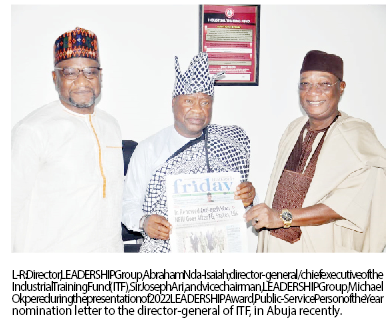When he was appointed by President Muhammadu Buhari in September 2016 as the director-general/chief executive of the Industrial Training Fund (ITF), expectations were high as the fund was confronted with challenges. The appointment of Sir Joseph Ntung Ari coincided with the period when morale of workers was at its ebb tide and threatening fears enveloping the fund of losing its relevance. Recapturing the glory of the past and returning the famous organisation noted for empowering the country’s teeming youths became the major objective. The emergence of Ari as DG of ITF was appropriately seen as a defining moment as he was expected to bring to bear his insider’s experience for the task ahead.
Without wasting time, he hit the ground running with a vision that combines steps to rally the fund’s workforce to improve on the dwindling fortunes of the agency that was then headed for the valley. The ITF under Sir Ari commenced efforts in transforming the agency into what it is today. His first action was to set up a committee that thoroughly reviewed the implementation of the ITF mandate. The committee produced a comprehensive and robust home-grown policy document called the ‘ITF Reviewed Vision: Strategies for Mandate Actualisation’. The implementation of the six-year plan, which was divided into quick wins, medium and long-term goals, commenced in late 2016.
Working on the thrust of the new envisioned plan that is hinged on provision of adequate skilled manpower to drive the nation’s economy, the then new ITF leadership under Ari devised a holistic approach to the provision of employable skills for job and wealth creation in the following areas where Nigeria has comparative advantage: The areas are Agro-allied, Construction, Services, ICT and Digital Jobs, Metal and Solid Minerals, Light Manufacturing and Oil and Gas.
Apart from repositioning the ITF, the new vision of the fund as unveiled by the Sir Ari-led management represents the fund’s most ambitious and comprehensive plan since the establishment of the agency. The new vision had timelines in achieving specific targets in various categories under quick wins, medium and long term goals, with effective strategies.
Quick Wins Strategies
The quick wins aim at resolving key challenges and turning the tides in favour of development and providing skills acquisition expertise. The quick wins goals also provide a “platform for the proactive participation of employers of labour in skills development; ensure full optimisation of employers training facilities for improved opportunities,” the ITF-NECA Technical Skills Development Programme (TSDP).
Under the job-matching system categorised under quick wins, the fund aims at achieving the objectives of creating a “platform that will contain work skills proficiencies, levels of work experience and professional reference of employable youths; provide a platform for employers to search and find candidates that meet specific skills/experience profiles they require; reduce search costs for qualified candidates and significantly enhance the ability of Nigerians to put their skills to work and unlock the market for work.
Medium Term
Under the medium-term vision, the ITF intends to “provide relevant knowledge, skills and attitude for productivity improvement; offer opportunity for the employed to enhance performance on the job and offer opportunity for the under-employed to upscale their skills for better job placement. Under apprenticeship, the ITF resolves to develop technical skills for job creation. The new plan also envisions a standardised curriculum for training delivery and generates a pool of competent craftsmen and artisans. Objectives of the Apprenticeship programme are aimed at assessing company facilities, personnel and training content; standardise training facilities, instructional materials and learning modules; monitor training implementation and compliance; grant approval and collaborate with relevant agencies for competency certification in generating a database of apprenticeship scheme.
Long Term
One of the long-term visions of the Ari-led leadership is the establishment of Industrial Skills Training Centres (ISTCs) in South-east, South-south and North-east geo-political zones of the country, with centres to be sited in Aba, Abakaliki, Port Harcourt and Jalingo. This strategy shall be achieved through acquisition of land and building workshops and offices; installation of relevant equipment and machinery; development of indigenous capacity to man the centres as well as designing and implementing appropriate training programmes.
Also identified under this category is the establishment of three automotive parts production and training centres in line with the automotive policy of the federal government to be located in Badagry, Nnewi and Kaduna. The objectives of these centres are to facilitate automotive parts import substitution; develop requisite skills in automotive spare parts production and encourage local production of automotive spare parts. The strategy for attaining the vision of automotive policy is developing indigenous capacity to man the centres; acquire and install relevant equipment/machinery as well as designing and implementing appropriate training programmes.
Skills Intervention And Acquisition Programmes
Considering the fact that technical vocational skills are integral to the growth and development of societies across the country since 2016, the ITF has been committed to equipping thousands of Nigerians with technical and vocational skills for employability and entrepreneurship. The focus on skills acquisition and the implementation of skills intervention programmes is premised on the fact that it remains the most sustainable solution to combating unemployment and poverty.
In realising the mandates of the ITF, especially on skills intervention programmes, the agency intervened through the following programmes: National Industrial Skills Development Programme (NISDP); Women Skills Empowerment Programme (WOSEP); Air-conditioning and Refrigeration (training on wheels); Designing and Garment Making (training on wheels) for Nigerian youths; Skills Training and Empowerment Programme for the Physically Challenged (STEPP-C);The InfoTech Skills Empowerment Programme (ISEP); Post-harvest Techniques and Project Development; Aqua-culture/Fish Farming; Manure production; Crop Production/Greenhouse Technology; Poultry farming and Special Skills Development Programme (SSDP). The Fund has also been involved in the Federal Government Skills Empowerment Programme (FEGOSEP); Vulnerable and Indigent Youth Empowerment Programme (VIYEP) and has further deployed nine training programmes free of charge for employers of labour on sustaining businesses during the Covid-19 pandemic.
Infrastructure
In line with the federal government’s commitment to the reduction of infrastructure deficits and coupled with the need to provide access to Nigerians desirous of acquiring technical skills, the ITF under Sir Ari has completed and commissioned several projects, including: The Mechatronics Workshop and Administrative Block at the Industrial Skills Training Centre (ISTC) Kano; Katsina Area Office Complex with an administrative and vocational wing; Lagos Island Area Office Complex and Vocational Wing; Modern e-Library Complex and Central Stores at the headquarters complex; and Classroom Blocks and Intro-tech Laboratory at the ITF Staff School.
Using its internally generated revenue (IGR), the Sir Ari-led leadership of the ITF has completed several other projects that are awaiting commissioning. They include: Gusau Area Office Complex and Vocational Wing; Minna Area Office Complex and Vocational Wing; Aba Area Office Complex and Vocational Wing and Access Road and the Owerri Area Office Complex and Vocational Wing.
Other projects awaiting commissioning are the Multi-purpose Building in Maitama, Abuja; the Institute of Hospitality Management at Oba-Akran in Lagos; Headquarters Auditorium and Gymnasium and an access road; a special Agriculture Greenhouse at Ofadaland in Ogun State; upgraded facilities at its Industrial Skills Training Centres (ISTCs) and the Model Skills Training Centre (MSTC), Abuja, among others.
Students Industrial Work Experience Scheme (SIWES)
Under the Students Industrial Work Experience Scheme (SIWES), the ITF under Sir Ari has recorded its most remarkable achievements. Before his appointment as DG, the SIWES programme was bedeviled by a backlog of unpaid students and supervisory allowances. Since 2016, the ITF has paid a total of N23,129,280,000 as students’ allowance, while N1,051,277,751 has been paid as supervisory allowance within the same period.
Innovation and improvement Of Service Delivery
In order to enhance service delivery, the ITF under the present management led by Sir Ari in late 2020 undertook a review of the then existing ‘10 departments and 4 units’ structure and expanded the same to ‘16 departments and 2 units’ structure to accommodate emerging needs. The 16 departments under the new structure are: Administration and Human Resources, Business Training, Corporate Planning, Field Services, Finance and Accounts, Information Communication Technology, Internal Audit, Legal and Council Affairs, Procurement, Public Affairs, Research and Curriculum Development, Revenue Inspectorate and Compliance, Standardisation Certification Consultancy Services as well as Technical and Vocational Skills Training Departments.
There is no doubt that the unprecedented strides achieved by Sir Ari have transformed him into ‘The Architect of Modern ITF’ especially in the task of refocusing the fund to its primary mandate of remaining the human resource development agency of the nation. His nomination as LEADERSHIP Public Servant of the Year 2022 is an attestation to his sterling management skills in changing the story of the fund since his appointment in 2016.





